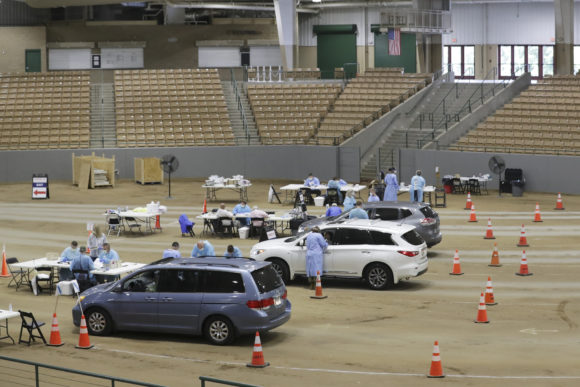NASHVILLE, Tenn. — Just a few weeks ago, Tennessee looked like a sure bet to become the latest state to protect businesses and other organizations from lawsuits by people impacted by the coronavirus in the push to reopen the economy. Republican Gov. Bill Lee had talked up the change and touted his advocacy on tort reform as a businessman, and he had GOP lawmakers in supermajorities lined up to seal the deal.
That was before negotiations among lawmakers broke down so badly in the hectic waning hours of legislative work that the generally mild-mannered Senate Speaker Randy McNally accused two House leaders of working with “a cabal of Democrats and attorneys to defeat the legislation and place our entire economy in danger.”
The failure by Republicans in control of both the Legislature and the governor’s office to pass a law demonstrates how challenging it is to navigate the complex legal waters of reopening. The debate was further complicated by the circumstances surrounding an outbreak at a middle Tennessee nursing home, with real-world implications for those already affected by the pandemic.
Infighting and finger-pointing among Tennessee Republicans have kept legislative talks at a stalemate, with hope dwindling that they could come to terms and meet for a special session vote before the Aug. 6 primary election — though Lee has promised the Legislature will eventually meet this summer while holding off on saying exactly when that will happen.
The business community, school systems and other groups that would have been protected have been left scratching their heads and pleading for a breakthrough.
“I guess why this is very disappointing to a lot of people in the business community, is we see this sort of behavior up in D.C.,” Bradley Jackson, president of the Tennessee Chamber of Commerce and Industry, said in an interview. “We see it in other states. We hear about it. But we’ve never had it in Tennessee. So we want to be proactive in working to make sure that we all get back on the same page and we all work together and get along.”
Meanwhile, education groups have reached out to the governor and legislative leaders, looking for help on a similar front. They argue that school districts should not have to weigh the costs of potential lawsuits as they eye reopening.
“We know that school district budgets are facing severe challenges as they attempt to re-open in the next few weeks. We desperately need this immunity legislation to protect our districts, schools, and educators from potential litigation costs and civil damages,” wrote J.C. Bowman, executive director of Professional Educators of Tennessee, in a recent letter.
The main dividing line over the liability bill was whether to make its protections retroactive to early March, which the Senate supported and the House opposed. Key lawmakers not only questioned whether it would be upheld in court but also whether adding a retroactive clause would make it blatantly illegal.
That’s because Tennessee’s Constitution states “no retrospective law, or law impairing the obligations of contracts, shall be made.” However, several lawmakers have countered they feel confident a court would side with the Legislature because the proposal would be in the public’s interest.
Yet those legal questions have big implications in House Majority Leader William Lamberth’s district, where 25 residents of a Gallatin nursing home died in an outbreak. A group of residents and former employees have sworn to sue the facility over its handling of the virus outbreak.
“I have no idea whether those lawsuits would be meritorious or not. That’s what the court system is for,” Lamberth said in an interview. “But I just didn’t feel comfortable going against my constituents’ wishes when they just want to have the same standard, the same rules in place if they decide to file a lawsuit that were in place at the time when their loved ones passed away.”
Critics of such legislation have countered that such actions only add another impossible barrier to employees seeking restitution from businesses that placed them at risk. Democratic lawmakers in Tennessee unsuccessfully tried to persuade their colleagues that liability lawsuits were already one of the toughest cases to bring before a judge _ adding additional restrictions would only punish those seeking justice.
Tennessee was one of the first states to begin reopening in late April after Lee reluctantly issued a safer-at-home order that forced businesses to close. Since then, case numbers have continued to rise in part due to more testing, but also because of an increase in community spread of the disease.
Yet the Volunteer State is hardly alone to consider providing COVID-19 liability protections for businesses, schools and other organizations.
Nearly 30 states have considered some sort of liability protection proposal since the pandemic first erupted across the country earlier this year, according to the National Conference of State Legislatures. Only a handful have failed to pass such legislation, while some governors have decided to tackle the issue by issuing executive orders. Meanwhile, business groups such as the U.S. Chamber of Commerce are lobbying for national liability protections.
About the photo: Workers administer COVID-19 tests at a drive-through facility set up in the Williamson County Agricultural Center, Thursday, July 2, 2020, in Franklin, Tenn. Tennessee Gov. Bill Lee issued a stern warning to the public Wednesday as Tennessee registered its highest daily increase in positive COVID-19 tests for the third time in a week and a half. (AP Photo/Mark Humphrey)
Was this article valuable?
Here are more articles you may enjoy.


 Asbestos Lawsuits Prompt Vanderbilt Minerals to File Bankruptcy
Asbestos Lawsuits Prompt Vanderbilt Minerals to File Bankruptcy  Stellantis Weighs Using China EV Tech for Affordable Cars
Stellantis Weighs Using China EV Tech for Affordable Cars  When the Workplace Is Everywhere: The New Reality of Workers’ Comp Claims
When the Workplace Is Everywhere: The New Reality of Workers’ Comp Claims  Explosive Wildfires Surge Through Oklahoma Panhandle and Kansas
Explosive Wildfires Surge Through Oklahoma Panhandle and Kansas 